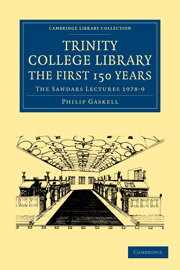Book contents
- Frontmatter
- Contents
- Lists of illustrations and plans
- Preface
- Terms and conventions
- Abbreviations
- 1546–1600
- 1601–1695
- 9 The New Library
- 10 Stanhope's Librarianship
- 11 Collections of manuscripts
- 12 The growth of the working collections, 1601–40
- 13 The arrangement of the books, 1601–40
- 14 Administration and reorganisation, 1641–74
- 15 The book stock, 1667–95
- 16 The last years of the New Library
- APPENDIXES
- Index
10 - Stanhope's Librarianship
Published online by Cambridge University Press: 05 August 2011
- Frontmatter
- Contents
- Lists of illustrations and plans
- Preface
- Terms and conventions
- Abbreviations
- 1546–1600
- 1601–1695
- 9 The New Library
- 10 Stanhope's Librarianship
- 11 Collections of manuscripts
- 12 The growth of the working collections, 1601–40
- 13 The arrangement of the books, 1601–40
- 14 Administration and reorganisation, 1641–74
- 15 The book stock, 1667–95
- 16 The last years of the New Library
- APPENDIXES
- Index
Summary
In 1603 Sir Edward Stanhope provided in his will for the support of a Librarian and a Sub-Librarian at Trinity. His initiative was timely, for the College Library was about to expand faster and to receive finer gifts than at any other time in its history. Stanhope may have had some foreknowledge of these developments, though his first aim seems to have been to increase the usefulness of the existing collection following its move to the new library apartment. Hindsight also suggests that some of the early seventeenth-century donors were encouraged to give generously by the establishment of the Librarianship.
Having already given the College £100 towards the cost of building the New Library, which was now almost completed, Stanhope decided to bequeath a further £700, the income from which was to provide for the Librarian and Sub-Librarian. A transcript of part of his will, which was intended for use as a College Ordinance, is given in Appendix D. It directed that the Librarian, appointed for life by the Master and Seniors, was to be a Scholar or former Scholar of the College, of good character, and at least a BA but not of higher degree than MA. He might not hold or accept any fellowship, office, or preferment, inside the College or out of it, so long as he continued Librarian. But, although not a Fellow, he was to enjoy a Fellow's privileges, having Fellows' commons, a room near the Library, and a money wage totalling £8 a year (which put him on a level with the junior College officers).
- Type
- Chapter
- Information
- Trinity College Library. The First 150 YearsThe Sandars Lectures 1978–9, pp. 75 - 78Publisher: Cambridge University PressPrint publication year: 2010First published in: 1980



